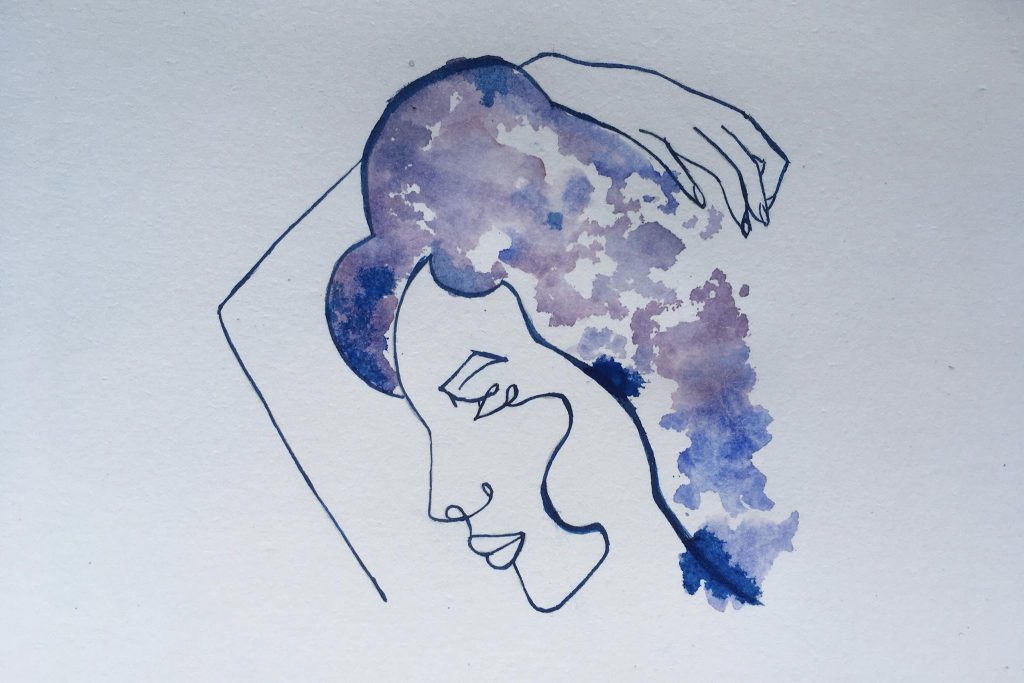I first caught head lice when I was eight. My father had left my mother just over a year before and had started a new family with a woman he may or may not have met before leaving us for good. In any event, my father’s new baby was a delicate, pink blob with a trail of black hair moulded to her scalp like the furry seaweed that clings to rocks at the beach.
I remember being seated on a wooden kitchen chair in the middle of the living room of a ground-floor Enfield flat one Saturday morning, a towel tucked into my collar, my father muttering that I was crawling with nits. My father’s new partner, Joan, hovered in the doorway, clutching a miniature sunhat I’d sported the night before (my father picked me up on Friday evenings every other weekend).
‘Megan, did you put on Molly’s hat?’ Joan asked. She was wringing the cloth in her hands, scrunching pink and yellow flowers into twisted, broken things.
I hesitated. ‘No.’
‘It’s OK if you did. I’m not cross. I just need to know if you put the hat on.’
‘I didn’t put the hat on,’ I mumbled, as my father dragged the comb through from crown to shoulder.
‘They’re literally falling out, Joan. She’s crawling with them.’
I bowed my head, mortified, and tried very hard not to itch above my ears. My father had snatched my hand away a couple of times when I’d reached to scratch. It was like being caught with your hands in your knickers.
‘Megan, I promise you we’re not cross. I just need to know if you put the hat on because Molly’s head is too soft to be combed. She cannot get nits.’
Joan threw a worrying look in my father’s direction, which I caught despite having my chin painfully embedded in my chest, with my father’s giant hand pressing down on the top of my head. I promised her I hadn’t put the hat on.
But I had. And she knew it. She’d been there. I was clowning around in the hat that didn’t fit my head, in the same vein as I had, some weekends before, announced myself to the room wearing a pair of Dad’s boxers and one of Joan’s lacy black bras. In a situation where my father had seemingly photocopied our family, drawn over the faces, and started again, the only way I could take up some space in the picture was through imitating this new family, becoming a caricature of the people who had themselves replaced me. Why Joan felt the need to interrogate an eight-year-old child when she could have just flung the hat in the washing machine at sixty degrees and saved me the shame I will never know. Perhaps she also thinks of this in the early hours, as I do.
My father, furious at my mother for not noticing the lice, arrowed all his accusations at me. How long have you been scratching? When was the last time you checked your hair? How could this have gone unnoticed?
I didn’t know how to answer any of them.
It’s true my mother hadn’t noticed. On school nights I had my dinner on a tray in front of the television and Mum spent a lot of her time either marking books at the dinner table or smoking in the conservatory. At weekends she took a lot of naps. I had been – until recently – an only child and was used to playing alone. Things seemed exactly the same yet entirely alien. For one, Dad was calling every evening to speak to me on the phone. He tended to revert to questions such as When was the last time you had a bath?
I guess overhearing your daughter repeat mechanically ‘No, I haven’t had a bath tonight’ was an infuriating experience. But at eight I wasn’t able to grasp that Dad asking if I’d had a bath was not really a personal slight on my hygiene, just as Mum slamming the phone down before I’d said goodbye wasn’t in anger that I’d admitted my ‘lack of’ hygiene to my father. The two were caught in a tug of who-gets-the-last-word and I was the rope. It happens to lots of kids, and manifests itself in different ways. For me, every tug confirmed I was a dirty child; no number of baths could quell it. Head bowed on the kitchen chair in that Enfield flat, forced to answer my father’s questions as to how I had become infested with head lice, I felt the panic begin to seep under my skin.
In all honesty, I knew I had nits but had said nothing for some time. Cross-legged on the parquet floor of the junior school assembly hall, I’d scratched the base of my neck and spied a moving thing under my fingernail. Astonished and curious, I pulled the finger closer to my eyes to study the creature, only for it to leap onto the floor and away.
The girl in front of me had recently come back from a family holiday with her hair braided into numerous tiny plaits. (This was in the early 2000s, when parents could take their children out in term time at no consequence. We never went anywhere in term time, though, as my mother was a teacher at my junior school and effectively had the same boss as I did). I wish I could say I envied the girl for having a family to take her on holiday, but this would be untrue. I simply coveted the purple braid that hung separately from the plaits, coiling down from her forehead and ending in three glassy beads. She had nits soon after. You could see the white specks in the patchwork of intersecting partings.
Of course, it could have been her who gave them to me. I can’t remember who was to blame, only that none of us were, because children get nits and that’s the end of it.
Only, it isn’t. At least, it wasn’t for me.
∆
For a year in my early twenties I lived with my boyfriend in the spare room of his uncle’s house in Bristol. There were three children under twelve. We were close. It was bound to happen. After a couple of days of itchiness, I asked my boyfriend to check my head before I left for work and what he found made him recoil – one big nit. He picked it out of my hair with forefinger and thumb like a monkey and dashed it on the floor in panic.
‘We’ll sort this out,’ he assured me as he gave me a hug, but I couldn’t help noticing his neck strained away to the right.
Then the combing and checking began.
I combed my hair twice a day for a week to be rid of the lice. After a week the lice were completely gone but the belief they were lurking had not. I had recurring dreams of falling into swamps full of bugs, desperately trying to shake crabs out of my hair, taking a hat off to find it crawling with nits. In the shower I’d run the comb through again and again, convinced if just one bug was savvy enough to avoid the metal teeth then I would never be rid of them. There was never anything there but that didn’t prove anything other than that there wasn’t anything there, only elsewhere.
Leslie Jamison, in her essay ‘Devil’s Bait’ talks of the botfly worm lodged in her ankle, and the obsession she developed over the wound once the worm was removed:
The idea of the worm – the possibility of the worm – was so much worse than actually having a worm, because I could never get it out. There was no not-worm to see, only a worm I never saw.
And so it was with the nits. The clean comb was never a sign of the not-nit, but confirmation that the nit was hiding, gaining ever more ground, becoming cleverer and more conniving in its strategies to avoid detection. At work an innocent itch on my arm would soon lead to a tingling sensation all over my scalp, as if I could feel bugs on the move across their territory.
I wore my hair in a ponytail so high on the top of my head that colleagues jokingly asked if I was sporting a new look. I avoided friends and family. I avoided everyone for fear I’d pass on the lice and they’d know it was me. At my cousin’s wedding, I told everyone I had a cold and so not to come too close. An uncle said he’d take the risk and hugged me anyway. Thank god he’s bald, I silently cried. But then everyone else said they’d take the risk too and I can’t remember the wedding for fear that the bride might be scratching under her ears like a cat on her honeymoon. A huge part of this fear was fear of detection. That someone would scratch, discover, make the connection, and there I would be, the centre of a shame I couldn’t admit to.
One of the many old wives’ tales I read about during this lonely time is that nits prefer clean to dirty hair. But it isn’t true; they don’t have a preference either way. Nits don’t discriminate. But people certainly do. To have lice as a kid is to run the risk of not being invited to upcoming birthday parties. To have lice as an adult is to be invited and find an excuse not to go.
To be dirty is to be alone, outcast, outlawed, if only by your own hand. Indeed, if cleanliness is next to godliness, then to be dirty is to be sub-par, sub-human.
∆
Eventually we moved out of my boyfriend’s uncle’s house to London, and the obsessive checking and combing died down to a once-in-a-while spontaneous search. But the nature of the city – enclosed, overlapping, condensing – made it difficult to avoid all the other millions of heads I could come into contact with. In Bristol, commuting to work involved a bus ride where I rarely had to share the two-person bench. In London, the tube necessitates close encounters with complete strangers on a twice-daily basis. How was I to know whether fellow commuters were harbouring hidden passengers of their own? I’d read that nits could only travel via head-to-head contact, but I’d seen that nit jump from under my nail and convinced myself they could leap small distances (I admit I could be remembering this wrong and the nit simply fell. As I know only too well, the mind is a treacherous thing). I bought a scooter to avoid the Underground. Scooting to work made me feel silly but it was fun downhill and I definitely couldn’t catch nits whizzing past angry pedestrians on two wheels.
That Bristol uncle hosted a party a few months ago. On the way up, I tied my hair in a knot on the top of my head and made a mental note to check for signs once we arrived. It had been over two years since we lived there but I wasn’t taking any chances. I knew the bugs were clever. When we got there, the youngest was wearing a onesie – and a woolly hat.
‘What’s with the hat, Em?’ I asked, though I already knew. She was sheepish and shrugged her shoulders. She’s only nine. At nine you have a deep-rooted sense of shame and adults seem to forget that kids are – at least at times – acutely self-aware. An article in The Guardian touches on this. ‘Poos, nits and handsy dads’ asked various professionals what they really think of working with children. Among the babysitters, teachers and entertainers’ laments of rude parents and spoilt students, the nit nurse said: ‘People forget what it’s like to be a kid with lice… It makes childhood quite an unpleasant experience… There’s a lot of emotion around headlice’. No shit. I too have been that girl in the hat, trying to deny the glaringly obvious. I was not about to do a Joan. But I could feel the creeping sensation at the nape of my neck, the tingling at the top of my ears, where thousands of tiny bugs were marching in troops to the high-pitched drumbeat: not-nit, not-nit, not-nit.
Forcing my exhausted boyfriend to search my head for nits for the third time in the week that followed led to a tearful discussion in the darkness about compulsion.
‘I think you have compulsive tendencies,’ he said carefully, stroking my arms under the duvet. ‘And I think it’s all linked to your dad.’
My father has (self-diagnosed) Obsessive-Compulsive Disorder (OCD). Like many men of his generation, he seems able to openly grant himself labels but refuses to seek any medical support. This is shrouded in comments like ‘the doctor can’t tell me anything that I don’t already know’ but hides a need to dismiss any opinion not his own as invalid, for fear of pulling out the one needle holding all the marbles in place. (I played a lot of KerPlunk when I was young because technically you only need one player. The box asks: ‘Is your hand steady enough to pull out the sticks without dislodging the marbles?’ I find it a marvellously apt metaphor.) Dad spends a great deal of time picking invisible ‘bits’ off the carpet and sweeping crumbs from the counter when the toast hasn’t yet popped. Hoovering is a forensic examination of both the floor and his clothes, even when wearing them. He does not put dirty dishes in the dishwasher – the machine is strictly for making washed crockery extra clean.
These things sound mildly compulsive, and I’m aware that using the term ‘OCD’ for someone stringently clean is as hazardous as saying you’re ‘depressed’ or have the ‘flu’. Words bandied around haphazardly risk undermining the suffering of those who do have such illnesses by inappropriately aligning oneself with their pain.
It feels like less shaky ground when I recall he discovered nail varnish remover is ‘good’ for burning out spots, and super glue suffocates verrucas. He uses bleach not only on every visible surface but also on his teeth. When Molly caught nits a few years ago, she passed them on to him. He washed his hair with bleach to be rid of them. It’s hardly a rational response, but it’s one that I can understand. At least, it’s one that I have inherited.
I have tried most of these remedies. Super glue does not work on verrucas but will result in a ruined Laura Ashley bedspread and a furious mother. Nail varnish remover does burn out spots but will leave a luminous scarlet scar in its place.
With the not-nit, an itch was no longer a thing to be scratched but a thing to be burned. I dunked my hair in boiling water and clamped straightening tongs as close to my scalp as I could bear. Little scabs formed under the hair from the damage I’d done but I just saw that as further proof that the bugs were there, hiding in the broken skin, perhaps even burying under it. I’d submerge myself in the bath for as long as I could, hoping I’d drown any remaining nit despite almost drowning myself.
The not-nit became ever more devious and my determination to outwit it ever more damaging. Plans to extricate myself from the not-nit became increasingly outlandish.
I was starting to sound like my father.
Overcoming Obsessive Compulsive Disorder, by consultant psychiatrist David Veale and CBT therapist Rob Willson, states that:
Compulsions like washing and checking persist because they seem to work by reducing distress or preventing anxiety. However, over time compulsions do not always go on working. Carrying out a compulsion may briefly reduce anxiety, but in the long term it increases the frequency of the obsession and the urge to perform the compulsion again. A vicious circle is thus maintained.
With compulsion, I don’t think the ‘vicious circle’ is ever merely ‘maintained’, rotating methodically on the pintle of anxiety at the same speed as a wind turbine. In the eye of the storm, the circle gyrates faster and faster until it’s absorbing everything in its path, like a tornado.
Indeed, it was only when I started considering the bleach that I realised things were out of control. I asked myself those well-worn questions over and over: How long have you been scratching? When was the last time you checked your hair?
∆
I asked a few friends if they had any similar experiences of a parent’s obsession with their children’s bodies. A few had a story to tell. My mum used to make me sit on the floor while she squeezed the spots on my back. My dad would tell me to blow my nose in front of my friends. My mum insisted on doing my hair before school – even through sixth form. All described how the parent seemed to derive a magnificent amount of pleasure from this activity, regardless of the child’s discomfort.
I’m not a parent, and I guess it’s hard to know when the body that was once an extension of you has become a body you do not have the right to impose on. As a teenager, my father would ask me when I’d last washed my hair or if I’d cleaned my teeth. He would tell me I had a spot that needed squeezing (or worse) attack a pimple he’d spied whether we were inside the house or on the street. I started scratching, squeezing, poking, picking, scraping, plucking, pulling, tweezing, waxing and combing in my attempts at hiding, avoiding, evading and outwitting my father. And by doing so I developed similar compulsive tendencies. Even now I can’t leave a spot alone. I catch myself running my fingers over my face in search of lumps, bumps, nicks and spots. It’s why I always have sore red lumps on my forehead, why I keep a nit comb and delousing shampoo in the shower.
Perhaps my preoccupation with nits is another manifestation of this need to keep my body under my control, to ensure there is no excuse for anyone to cross the chalk lines I’ve drawn around my feet. Perhaps it’s that I’ve also imbibed my father’s obsession with cleanliness and feel compelled to search and search for any sign of a breach. Maybe I’m just absolutely terrified of catching nits again. It’s a rational fear, to be concerned with hosting a parasite. Although Freud, in his case study of Frau Emmy Von N, explains that, while the woman’s phobia of toads corresponds to the ‘primary phobias of human beings’, it is also the case that the phobia was ‘established more firmly by traumatic events’. (In Frau Emmy Von N’s case, it was one of her brothers throwing a dead toad in her face.)
When I search online to see if there is a specific word for my phobia (of course there is), massivephobia.com tells me ‘Pediculophobia is the intense and irrational fear of lice’. Another site (another excellent name) changethatsrightnow.com states:
…the fear is a physical response to patterns of thinking about lice and not the actual lice.
I think back to Leslie Jamison: ‘Itching is a feedback loop that testifies to the possibility of symptoms that dwell in a charged and uneasy space between body and mind.’ That charged and uneasy space is me, all the time. When I feel ashamed about my body’s supposed or real imperfections, I feel like I am purely mind. I take no ownership, but am somehow chained forever to this hunk of ham.
I should not have to be responsible for this body.
But, when my body shows me for the millionth time that there really is no nit, I laugh in the face of my mind and cheer this glorious body for ticking along all the while without my doing very much.
This body is responsible without me.
But wounds heal on the skin whereas they fester in the brain: the itching always comes back. The compulsion to check just in case always comes back.
∆
Testimonies from far corners of the internet document nit myths (you can get head lice from pets), how to overcome irrational fears (build a ‘fear ladder’), and somewhat redundant pointers to give your kids (don’t spend countless minutes with your head next to someone else’s). Help is also at hand. US company Lice Happens charges by the hour for hair-picking services (though their motto ‘No Shame, No Blame’ feels sadly naïve). The Change That’s Right Now website has an online test to indicate how extreme your pediculophobia is. One question asks:
How bad are your symptoms of pediculophobia?
- A. The symptoms are really bad and I have used drugs.
- B. The symptoms are really bad but I’ve avoided using meds.
- C. The symptoms are uncomfortable and I have used drugs.
- D. The symptoms are uncomfortable but I’ve avoided using meds.
- E. I don’t really experience significant symptoms.
Symptoms listed on the site include racing heartbeat, dry mouth and clammy hands. I don’t get any of those but there’s no option for ‘bought a scooter to avoid taking the tube’. My symptoms are definitely more than ‘uncomfortable’ and, if I didn’t really experience them, I sure as hell wouldn’t be on changethatsrightnow.com taking a quiz trying to calculate how severe my fear of lice is.
My quiz needs to ask different questions.
- • Do you catastrophise situations where you feel embarrassed, dirty or ashamed?
- • Do you experience compulsive behaviours as a result of your phobia?
- • Do you think your obsessive compulsions are linked to childhood trauma?
A phobia can take on features almost identical to obsessional disorder. Most people who have experienced phobic episodes have elevated levels of anger, sadness, hurt, guilt and fear about their past. Overcoming Obsessive Compulsive Disorder says: ‘Life experiences that can trigger obsessive and or compulsive behaviours include ‘serious’ childhood events such as emotional neglect.’
On the surface, my father wasn’t one for emotional neglect but for emotional overload. Can too much of something be the same as not enough? I think, in some cases, they are inextricably linked. My father’s preoccupation with my body and how I took care of it was an act of emotional overload. Not considering the impact of this incessant scrutiny on my self-worth was an act of emotional neglect.
I fear that inside, I will always be as he put it: crawling with nits. And the itch will always come back.
Meg Lewis is a writer and editor based in London. A recent graduate of the Birkbeck Creative Writing MA, her work has featured in Willesden Herald New Short Stories 10 and Notes. She was recently awarded a special mention in the Spread the Word Life Writing Prize 2020. ![]() @meg_lewis_
@meg_lewis_
Cover art by Lizzie Casey.





